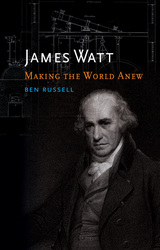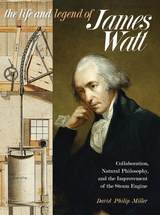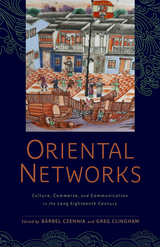
To record this fascinating narrative, Russell draws on a wide range of resources—from archival material to three-dimensional objects to scholarship in a diversity of fields from ceramics to antique machine-making. He explores Watt’s early years and interest in chemistry and examines Watt’s partnership with Matthew Boulton, with whom he would become a successful and wealthy man. In addition to discussing Watt’s work and incredible contributions that changed societies around the world, Russell looks at Britain’s early industrial transformation. Published in association with the Science Museum London, and with seventy illustrations, James Watt is not only an intriguing exploration of the engineer’s life, but also an illuminating journey into the broader practices of invention in the eighteenth and early nineteenth centuries.

The Life and Legend of James Wattoffers a deeper understanding of the work and character of the great eighteenth-century engineer. Stripping away layers of legend built over generations, David Philip Miller finds behind the heroic engineer a conflicted man often diffident about his achievements but also ruthless in protecting his inventions and ideas, and determined in pursuit of money and fame. A skilled and creative engineer, Watt was also a compulsive experimentalist drawn to natural philosophical inquiry, and a chemistry of heat underlay much of his work, including his steam engineering. But Watt pursued the business of natural philosophy in a way characteristic of his roots in the Scottish “improving” tradition that was in tension with Enlightenment sensibilities. As Miller demonstrates, Watt’s accomplishments relied heavily on collaborations, not always acknowledged, with business partners, employees, philosophical friends, and, not least, his wives, children, and wider family. The legend created in his later years and “afterlife” claimed too much of nineteenth-century technology for Watt, but that legend was, and remains, a powerful cultural force.

Published by Bucknell University Press. Distributed worldwide by Rutgers University Press.

,The scientific correspondence of Watt, Black, Robison and others, together with James Watt's notebook of experiments on heat, edited by Eric Robinson and Douglas McKie.,
, The close friendship that grew up between Dr. Joseph Black, the,discoverer of specific and latent heats, and James Watt, the scientific instrument maker who was destined to become perhaps the greatest engineer of all time, is in,itself a dramatic relationship, not before fully appreciated, Here for the first time is the full text of all their surviving correspondence, known only fragmentarily before in J. P. Muirhead's Life and Mechanical Inventions of James Watt, and there rather freely amended by the editor.,
The amazing range of Watt's interests--in the firing of delft and stoneware, the manufacture of alkali from salt, the invention of scientific instruments as well as the copying press, and many other matters beside the steam-engine--is revealed here. Watt's own position as a scientist and the quality of his association with Black in further experiments on latent heat are fully documented. But the,correspondence is also valuable for the light it sheds on many aspects of life in Britain in the later half of the eighteenth century.
In addition, Watt's notebook on his experiments on heat, known before only through quotation, is presented complete. This is a primary source of first-rate importance to the historian of science.
READERS
Browse our collection.
PUBLISHERS
See BiblioVault's publisher services.
STUDENT SERVICES
Files for college accessibility offices.
UChicago Accessibility Resources
home | accessibility | search | about | contact us
BiblioVault ® 2001 - 2024
The University of Chicago Press









